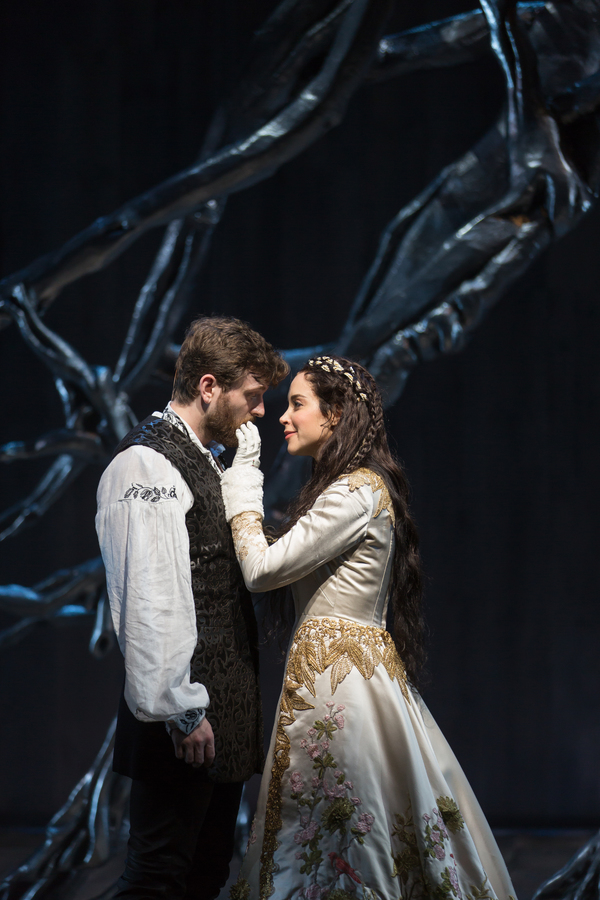Review Roundup: Alexandra Silber and Ken Clark in CAMELOT at Shakespeare Theatre Company
 The Shakespeare Theatre Company's production of Lerner and Loewe's multiple Tony Award-winning musical Camelot, directed by STC Associate Artistic Director Alan Paul (Kiss Me, Kate; Man of La Mancha), is now on stage through July 1.
The Shakespeare Theatre Company's production of Lerner and Loewe's multiple Tony Award-winning musical Camelot, directed by STC Associate Artistic Director Alan Paul (Kiss Me, Kate; Man of La Mancha), is now on stage through July 1.
With the much-beloved music of Lerner and Loewe (My Fair Lady), Camelot depicts the powerful love triangle between King Arthur, his Queen, Guenevere, and the knight Lancelot. It also tells a strikingly familiar tale of a leader's integrity, courage and empathy-a chronicle of the struggle for civilization and goodness in a world accustomed to violence and hate, and a hymn to an era of leadership that upheld idealism and championed the potential of humankind.
Almost 60 years after it premiered on Broadway, the enchanting score, featuring If Ever I Would Leave You and I Loved You Once in Silence, continues to captivate musical theatre audiences.
STC Affiliated Artists Ted Van Griethuysen (Merlyn) and Floyd King (King Pellinore) will join an impressive cast of actors including Ken Clark (King Arthur), Nick Fitzer (Lancelot du Lac) and Grammy Award-nominee Alexandra Silber (Guenevere), who will make their STC debuts.
Recipient of the 2012 Regional Theatre Tony Award, the Shakespeare Theatre Company (STC) is the nation's leading premier classical theatre company. Today, STC is synonymous with artistic excellence and making classical theatre more accessible to audiences in and around the nation's capital.
Let's see what the critics have to say!
Peter Marks, The Washington Post: And when the music is supplied by a fine 10-member orchestra, accompanying the likes of Alexandra Silber as an ardent, alluring Guenevere and Nick Fitzer, playing divinely self-confident Lancelot du Lac, the delights become magnified. Fitzer's delivery of "If Ever I Would Leave You," the pastoral love ballad Lancelot sings to Guenevere, is, in a word, sensational, and the performance is such that you may find yourself asking, "Where did they get this guy?" To other directors out there looking for a romantic musical-theater leading man I can declare: C'est lui.
Evann Normandin, BroadwayWorld: Every iota of design at Sidney Harman Hall is a sensual treat. From the imposing silver tree Arthur climbs to catch a glimpse of his future bride to the dimly lit bedroom in which Arthur and Guenevere steal intimate moments, the production value does not let up. Sumptuous lighting design by Robert Wierzel and costume design by Ana Kuzmanic could not be better suited to this show. While the costumes were largely magnificent, I question the decisions surrounding the "Fie on Goodness" costuming. Both the staging and costuming felt more "Greased Lightning" than Camelot, and I was briefly jarred awake from the continuity of our shared dream.
Geoffrey Melada, DC Metro Theater Arts: Scenic designer Walt Spangler's bed of crimson rose petals redeems the bad blocking in this scene, and it's a brilliant choice to have those petals remain on stage long after Lance and Genny have consummated their forbidden passion. As they swirl together on stage, the rose petals resemble a pool of blood, a leaking wound that threatens to engulf Arthur's castle and country and cannot be ignored.
Andre Hereford, Metro Weekly: Both the character and Vaill's performance serve the production well. Mordred embodies a crafty political foil for Arthur, and drives home the tragedy that befalls this dreamer of a king determined to drag his nation out of the Dark Ages and into the light of reason and civility. Arthur chooses compassion over anger, unity over jealousy, and believes in the audacity of hope. He doesn't succeed, but the dream survives.
Meaghan Hannan Davant, DC Theatre Scene: Clark, whose earlier performance as the young, naïve Arthur is at once wily and ebullient, swiftly unravels into a sullen and broken old man. Pacing the stage, he becomes a railing, raving King Arthur, spitting his distress at the audience with the gravity of Richard III. This shift in the weightiness of the play endures throughout a second act that felt tediously long, though had half the running time of the first act. By the time Camelot arrives at its last (hopeful) gasp, it is too much to ask of the audience to find redemption (even with a child actor as winsome and compelling as Trinity Sky Debreu).
Reader Reviews
Videos

